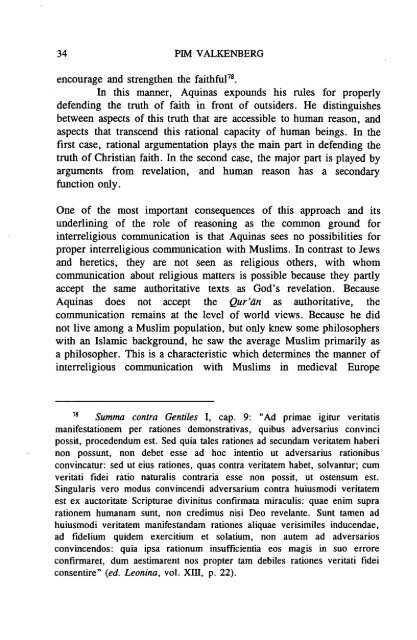Jaarboek Thomas Instituut 1997 - Thomas Instituut te Utrecht
Jaarboek Thomas Instituut 1997 - Thomas Instituut te Utrecht
Jaarboek Thomas Instituut 1997 - Thomas Instituut te Utrecht
You also want an ePaper? Increase the reach of your titles
YUMPU automatically turns print PDFs into web optimized ePapers that Google loves.
34 PIM VALKENBERG<br />
encourage and strengthen the faithful".<br />
In this manner, Aquinas expounds his rules for properly<br />
defending the truth of faith in front of outsiders. He distinguishes<br />
between aspects of this truth that are accessible to human reason, and<br />
aspects that transcend this rational capacity of human beings. In the<br />
first case, rational argumentation plays the main part in defending the<br />
truth of Christian faith. Inthe second case, the major part is played by<br />
arguments from revelation, and human reason has a secondary<br />
function only.<br />
One of the most important consequences of this approach and its<br />
underlining of the role of reasoning as the common ground for<br />
in<strong>te</strong>rreligious communication is that Aquinas sees no possibilities for<br />
proper in<strong>te</strong>rreligious communication with Muslims. In contrast to Jews<br />
and heretics, they are not seen as religious others, with whom<br />
communication about religious mat<strong>te</strong>rs is possible because they partly<br />
accept the same authoritative <strong>te</strong>xts as God's revelation. Because<br />
Aquinas does not accept the Qur'än as authoritative, the<br />
communication remains at the level of world views. Because he did<br />
not live among a Muslim population, but only knew some philosophers<br />
with an Islamic background, he saw the average Muslim primarily as<br />
a philosopher. This is a charac<strong>te</strong>ristic which de<strong>te</strong>rmines the manner of<br />
in<strong>te</strong>rreligious communication with Muslims in medieval Europe<br />
78 Summa contra Gentiles I, cap. 9: "Ad primae igitur ventans<br />
manifestationem per rationes demonstrativas, quibus adversarius convinci<br />
possit, procedendum est. Sed quia tales rationes ad secundam verita<strong>te</strong>m haberi<br />
non possunt, non debet esse ad hoc in<strong>te</strong>ntio ut adversarius rationibus<br />
convincatur: sed ut eius rationes, quas contra verita<strong>te</strong>m habet, solvantur; cum<br />
veritati fidei ratio naturalis eontraria esse non possit, ut os<strong>te</strong>nsum est.<br />
Singularis vero modus convincendi adversarium contra huiusmodi verita<strong>te</strong>m<br />
est ex auctorita<strong>te</strong> Scripturae divinitus confirmata miraculis: quae enim supra<br />
rationem humanam sunt, non credimus nisi Deo revelan<strong>te</strong>. Sunt tarnen ad<br />
huiusmodi verita<strong>te</strong>m manifestandam rationes aliquae verisimiles inducendae,<br />
ad fidelium quidem exercitium et solatium, non au<strong>te</strong>m ad adversarios<br />
convincendos: quia ipsa rationum insufficientia eos magis in suo errore<br />
confirmaret, dum aestimarent nos prop<strong>te</strong>r tam debiles rationes veritati fidei<br />
consentire" (ed. Leonina, vol. xm, p. 22).








